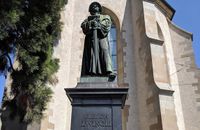Difference between revisions of "Sermon for October 10th, 2021"
| Line 6: | Line 6: | ||
==Ulrich Zwingli: With Sword in Hand== | ==Ulrich Zwingli: With Sword in Hand== | ||
| − | Tomorrow is the 490th anniversary of the Battle of Kappel. In this battle, 7,000 Catholic soldiers descended upon the protestant city of Zurich in Switzerland. It was a surprise attack, and the citizens of Zurich were only able to muster about 2,000 defenders. The battle lasted less than an hour, and ended in defeat for the protestants. 25 pastors fell in battle defending their city | + | Tomorrow is the 490th anniversary of the Battle of Kappel. In this battle, 7,000 Catholic soldiers descended upon the protestant city of Zurich in Switzerland. It was a surprise attack, and the citizens of Zurich were only able to muster about 2,000 defenders. The battle lasted less than an hour, and ended in defeat for the protestants. 25 pastors fell in battle defending their city that day. Among them, in fact leading the protestant army, was the pastor Ulrich Zwingli, who died with his sword in his hand. |
[[File:Zwingli.jpeg|200px|thumb|left]] | [[File:Zwingli.jpeg|200px|thumb|left]] | ||
| + | |||
| + | I took this picture when I had the opportunity to visit Zurich a few years ago--it's a great depiction of Zwingli by his people in the city where he pastored. From the moment I saw the statue, I knew I wanted to preach a sermon about him. I knew I wanted to learn more about him, too. Zwingli is often considered the third most influential of all the 16th century reformers, behind only Martin Luther and John Calvin. But he's also the least well known of the three, although his teachings were a clear influence on Calvin as well as the followers of Luther. | ||
Revision as of 14:55, 9 October 2021
Ephesians 6:10-17
10 Finally, be strong in the Lord and in the strength of his power. 11 Put on the whole armor of God, so that you may be able to stand against the wiles of the devil. 12 For our[b] struggle is not against enemies of blood and flesh, but against the rulers, against the authorities, against the cosmic powers of this present darkness, against the spiritual forces of evil in the heavenly places. 13 Therefore take up the whole armor of God, so that you may be able to withstand on that evil day, and having done everything, to stand firm. 14 Stand therefore, and fasten the belt of truth around your waist, and put on the breastplate of righteousness. 15 As shoes for your feet put on whatever will make you ready to proclaim the gospel of peace. 16 With all of these,[c] take the shield of faith, with which you will be able to quench all the flaming arrows of the evil one. 17 Take the helmet of salvation, and the sword of the Spirit, which is the word of God.
Hebrews 4:12-13
12 Indeed, the word of God is living and active, sharper than any two-edged sword, piercing until it divides soul from spirit, joints from marrow; it is able to judge the thoughts and intentions of the heart. 13 And before him no creature is hidden, but all are naked and laid bare to the eyes of the one to whom we must render an account.
Ulrich Zwingli: With Sword in Hand
Tomorrow is the 490th anniversary of the Battle of Kappel. In this battle, 7,000 Catholic soldiers descended upon the protestant city of Zurich in Switzerland. It was a surprise attack, and the citizens of Zurich were only able to muster about 2,000 defenders. The battle lasted less than an hour, and ended in defeat for the protestants. 25 pastors fell in battle defending their city that day. Among them, in fact leading the protestant army, was the pastor Ulrich Zwingli, who died with his sword in his hand.
I took this picture when I had the opportunity to visit Zurich a few years ago--it's a great depiction of Zwingli by his people in the city where he pastored. From the moment I saw the statue, I knew I wanted to preach a sermon about him. I knew I wanted to learn more about him, too. Zwingli is often considered the third most influential of all the 16th century reformers, behind only Martin Luther and John Calvin. But he's also the least well known of the three, although his teachings were a clear influence on Calvin as well as the followers of Luther.
